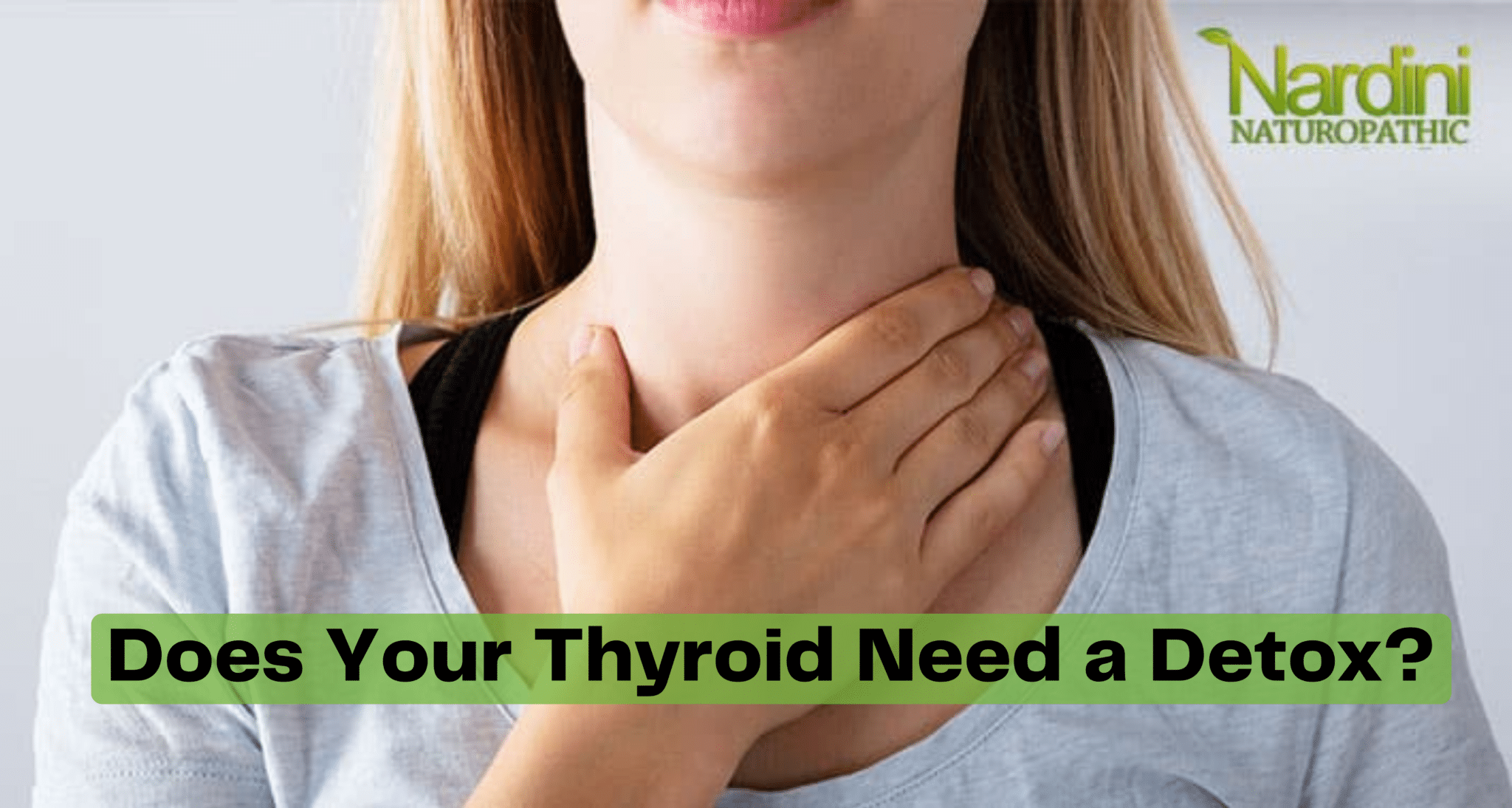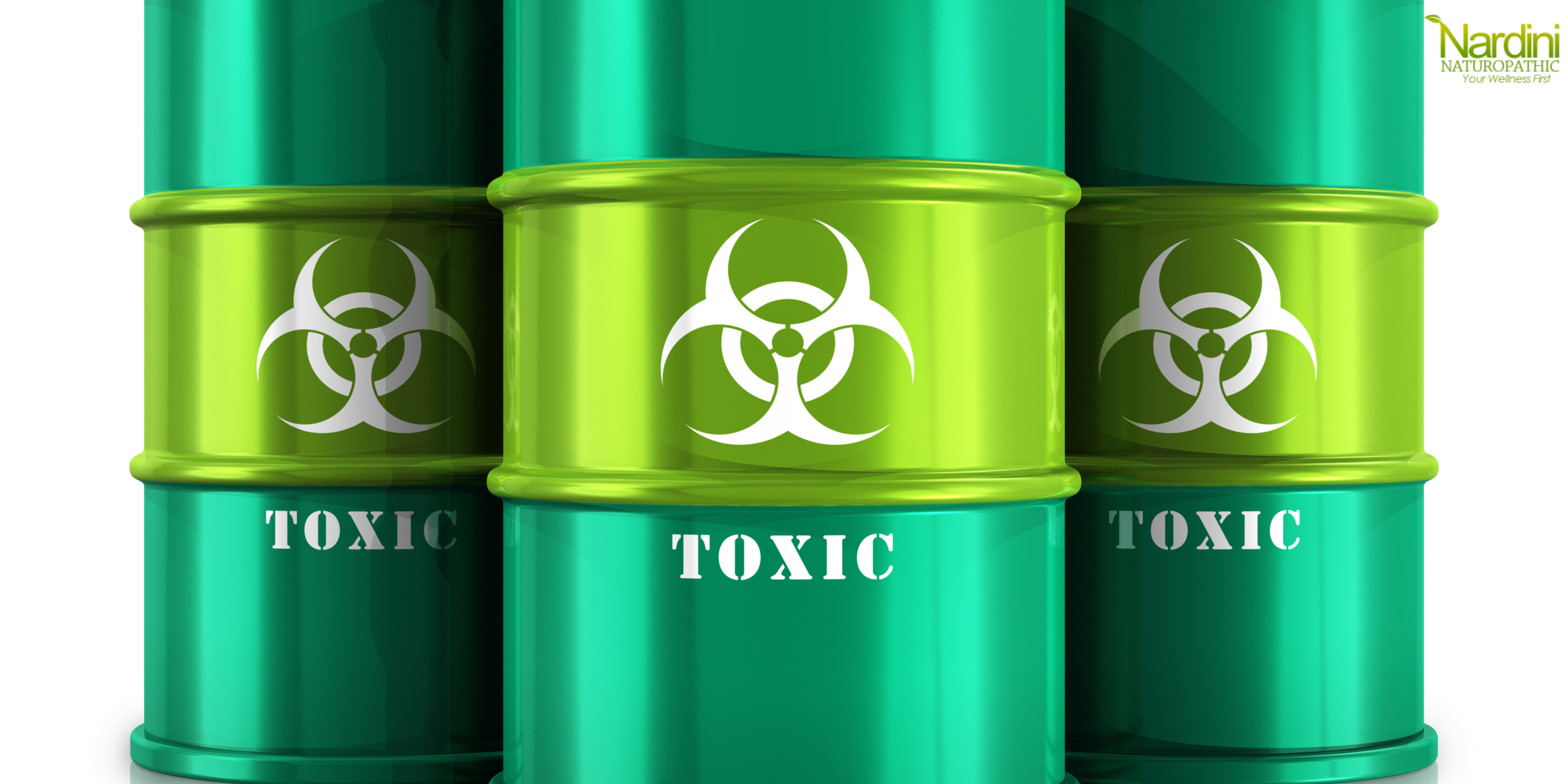Most of us are aware of the toxins in our environment. They are in our air, water, and food. They can also come from the inside because of normal metabolism and, sometimes, from stress.
The concept of detoxification is also widely known. Although not conventionally recognized, many alternative healing traditions consider regular detox to be an essential part of a healthy lifestyle. Most detox protocols focus on the main organs of detoxification – the liver, kidneys, lymphatic system, digestive system, and skin.
Surely, when the body has toxicity, the toxins affect many if not all of the organs and tissues of the body. What if a specific organ or gland becomes toxic and a generalized detox is not enough to restore it to health? It becomes necessary, then, to also address the organ directly to remove the toxins and replenish its required nutrients.
The thyroid gland is one such organ that can be affected by various toxins. When the thyroid gland is intoxicated, it’s function is often impaired. Since this gland is so important to health, is it not critical to detoxify the thyroid of any chemicals or other factors that could be impairing it?
I’d like to discuss some of these factors that can cause the thyroid to be toxic and how we can restore its vital function.
Thyroid Toxins
At this point, you may be wondering what exactly can make the thyroid toxic. There are so many factors in our environment that can interfere with thyroid function. Here is a short list of some of the big ones:
- Heavy Metals (mercury, lead, cadmium, arsenic, aluminum)
- Halogens (fluorine, bromine, chlorine)
- Endocrine disruptors (in consumer products and pesticides)
- Medications
- EMFs (electromagnetic frequencies)
Let’s take a more in-depth look into these toxins to see how they can interfere with thyroid health and thyroid hormone function.
1. Heavy Metals
We’re not talking about Judas Priest and Iron Maiden here. The heavy metals I’m referring to are the ones pumped out by industry that end up in our food, water, and air. They are persistent in the environment and can persist in our bodies if we don’t actively remove them.
Mercury is of particular importance here. In addition to being a known neurotoxin1, mercury can also cause inflammation in the thyroid gland. It seems to accumulate as we age and may contribute to thyroid cancer, autoimmune thyroid disorders, and hypothyroidism (underactive thyroid)2. Besides being present in industrial effluent, certain medications (some vaccines) and amalgam tooth fillings also contain mercury.
Aluminum is another common contaminant that may affect the thyroid. It is present in pots and pans, aluminum foil, and deodorant. Although oral exposure to aluminum is considered to be of low toxicity, children’s main exposure to this metal is likely through aluminum adjuvants present in vaccines. The aluminum in this form has the potential to contribute to autoimmune reactions, some of which may affect the thyroid3.
Arsenic (present in chicken, rice, and pesticides), lead (present in lead paints, ceramics, and cigarette smoke), and cadmium (present in tap water, shellfish, coffee, and cigarette smoke) are other common heavy metal contaminants that may have a direct or indirect impact on the thyroid.
2. Halogens
The thyroid gland requires iodine to make thyroid hormones, like T4 and T3. Iodine is a halogen on the periodic table of elements. Also part of this halogen group are fluorine, bromine, and chlorine. Since they are chemically very close to iodine, these other halogens can interfere with iodine’s function, including the production of thyroid hormones.
Fluorine is present as fluoride in consumer products, like toothpaste and mouthwashes, in dental treatments, and in the tap water of many municipalities. Research has shown that fluoride in drinking water can impact the T3, T4, and TSH (thyroid stimulating hormone) levels in the body4.
Bromine is another halogen that impacts the thyroid. Like fluorine, bromine can substitute for iodine in the body, and has been shown in research to elevate TSH levels5. This finding suggests that bromine may contribute to hypothyroidism. Bromine is found in commercially prepared breads, citrus-flavoured soft drinks, hair care products, pool disinfectants, and in flame-retardants.
Perhaps even more prevalent in the environment, chlorine is another halogen that can negatively affect thyroid function. It is used as a disinfectant in bleach, swimming pools, and drinking water and is also present in pesticides. Studies have shown that chlorine may reduce T4 and T3 production by the thyroid6.
3. Endocrine Disruptors
There is a class of synthetic chemicals, known as endocrine disruptors, that have the ability to mess up the delicate hormonal balance of the body. They are especially problematic because they are everywhere – in plastic water bottles, pesticides, cosmetics, sanitizers, household cleaners, and some pharmaceuticals.
With the hand sanitizer craze in the past few years, many people have been exposed to large amounts of triclosan, a common ingredient in personal sanitation products. It is present in anti-bacterial soaps, hand sanitizers, mouthwashes, cosmetics, detergents, and dishwashing liquids. A review article in 2022 found that several research studies have found a negative correlation between triclosan and thyroid hormones7.
Parabens, synthetic waxes that are present in cosmetics and many personal care products, can be extremely toxic to the thyroid system. A 2022 study in zebrafish, demonstrated that various parabens reduce thyroid hormone production and can disrupt endocrine function in the hypothalamus-pituitary-thyroid gland axis8.
Bisphenol A, or BPA, has been used in the plastics industry for decades, especially in plastic food containers and water bottles. It has shown to be a mimicker of estrogen, which may have an indirect negative effect on thyroid health9. More recent industry “replacements” of Bisphenol A – Bisphenol S (BPS) and Bisphenol F (BPF) – are not any safer10.
Other known endocrine disruptors that may affect thyroid health include dioxins, perchlorate, and phthalates.
4. Medications
There are, of course, pharmaceuticals that are prescribed specifically to affect thyroid function. The most prescribed class of thyroid medications is the thyroid hormone replacement drugs, like Synthroid and generic levo-thyroxine. These are synthetic versions of T4 thyroid hormone that are used to treat hypothyroidism.
With long-term use, these medications can actually reduce the production of active T3 thyroid hormone, leading to a functional hypothyroidism (not detected by blood tests), sometimes known as Wilson’s Temperature Syndrome (WTS).
In cases where the thyroid is overactive (hyperthyroidism), thyroid-supressing medications, like propylthiouracil and methimazole, are often prescribed. These drugs slow the production of thyroid hormones to combat the hyperthyroidism. However, over-prescribing these medications can result in an underactive thyroid system.
There are some medications that are not specifically prescribed for thyroid health that may have effects that impact the thyroid system.
Amiodarone is an iodine-containing medication used to treat irregular heart rhythm. It is known to interfere with thyroid hormone function and can damage the thyroid gland itself11.
Lithium is a mineral sometimes used in the treatment of bipolar disorder. It can interfere with thyroid hormone production by the thyroid gland, block the conversion of T4 thyroid hormone into active T3 thyroid hormone, and increase the risk of autoimmune thyroid inflammation12.
This is not an exhaustive list of medications that can affect the thyroid. If you have or suspect that you have a thyroid condition, it’s important to double-check interactions with any medication you may be taking.
5. Electromagnetic Frequencies (EMFs)
Electromagnetic frequencies, or EMFs, are everywhere these days. Because they are invisible, you may be surprised by the level of exposure you are getting. Cell phones, smart watches, computers, tablets, WiFi routers, televisions, microwave ovens, medical devices, and even wall sockets emit waves that, research confirms, have harmful effects on the body, including the thyroid.
It has been known for some time that a certain type of EMF, called ionizing radiation, is harmful to the body’s cells. X-rays and gamma radiation are two examples that people can be exposed to through dental and medical procedures. Lengths are taken to minimize the harms from this radiation during such procedures.
It is the non-ionizing type of radiation, that we consider to be less toxic, which we are over-exposed to. These EMFs come from the electronic devices I mentioned above. But “less toxic” does not mean “non-toxic”. Much research has come out over the past few decades that shows how non-ionizing EMFs can damage health and may even cause cancer13.
A recent review of studies reveals that EMFs can be of harm to the thyroid gland14. The studies showed changes in TSH and T4 levels and even reduced volume of thyroid gland follicles in humans exposed to mobile phone radiation. In animal research, negative effects on thyroid gland function were seen with EMF exposure even below the exposure level that causes heating (the thermal threshold).
Devices that emit EMFs are only safety-tested for their thermal effects, that is, adverse reactions to levels of radiation that would cause tissues to heat up. EMF exposure that is too low to cause heating is never tested, so safe non-thermal exposure levels have never been established.
Clearly, even low-level EMF exposure can negatively impact the thyroid. To maintain or recover healthy thyroid system function, minimizing exposure to potentially harmful EMFs is critical.
How Do You Detox Your Thyroid?
As we see, there are numerous factors that can cause your thyroid to be toxic. And that doesn’t include one of the top negative influences on your thyroid – stress! The question becomes – how best to detox the thyroid to restore its optimal function?
Reducing exposure to foods, medications, and products that contain thyro-toxic chemicals and minimizing EMF radiation is a good start. Thyroid-specific nutrients, like iodine, selenium, zinc, and tyrosine are also important for maintaining healthy thyroid function and opposing the effects of the toxins. And I can’t over-emphasize the benefits of lifestyle changes for stress management.
In my next article, I will get into some of the specific measures that you can take to rid the body of thyroid toxins.
Check it out here.
1. https://www.epa.gov/mercury/health-effects-exposures-mercury
2. href=”https://pubmed.ncbi.nlm.nih.gov/33561145/
3. https://pubmed.ncbi.nlm.nih.gov/22235057/
4. https://www.ncbi.nlm.nih.gov/pmc/articles/PMC5805681/
5. https://www.ncbi.nlm.nih.gov/pmc/articles/PMC501258/
6. https://www.ncbi.nlm.nih.gov/pmc/articles/PMC1567021/
7. https://pubmed.ncbi.nlm.nih.gov/35721761/
8. https://pubs.acs.org/doi/10.1021/acs.est.1c06562
9. https://pubmed.ncbi.nlm.nih.gov/23796010/
10. https://www.pnas.org/doi/10.1073/pnas.2115308119
11. https://pubmed.ncbi.nlm.nih.gov/24067547/
12. https://thyroidresearchjournal.biomedcentral.com/articles/10.1186/1756-6614-6-3
13. https://pubmed.ncbi.nlm.nih.gov/35163262/
14. https://www.ncbi.nlm.nih.gov/pmc/articles/PMC8451508/
Book An Appointment With Nardini Naturopathic
Are you concerned that your thyroid may need a detox?
Or perhaps you’d like a review of your overall diet to see where you could be doing better.
Maybe you have food allergies or intolerances and worry you aren’t getting enough nutrients because of your restricted diet.
I’m Dr. Pat Nardini, a naturopathic doctor who offers nutritional counseling services to help ensure all of those gaps in your diet are filled, and that you’re getting enough of all the important nutrients which your body needs to function at its best.
Contact me today for more information, or book a free 15-minute consultation where I will help you understand how naturopathic medicine can help you.
If you have questions about naturopathic medicine, or you’d like to take your first step into the world of naturopathy, contact us at Nardini Naturopathic, and let’s book an appointment.
Yours in health,
Dr. Pat Nardini, Naturopathic Doctor
320 Danforth Ave suite 206,
Toronto, ON, M4K 1N8
-https://g.page/NardiniNaturopathicDanforth
Dr. Pat Nardini, ND is a licensed doctor of naturopathic medicine in Toronto, Ontario. He offers science based natural health solutions with a special focus on thyroid conditions.


